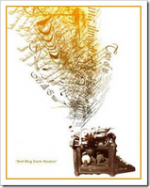Today I went to an excellent shiur by R’ Wallerstein. I’ve always heard how great a speaker he was, but I’ve never heard him speak live till now. He spoke about the mishnah in Pireki Avos that says “Remember these 3 things and it will keep you from doing an Avaira: 1- Know where you came from, 2- Know where your going, 3- Know you will have to give a din v’cheshbon of what you have done in life.”
He said you can compare it to a GPS, that it has to know where your coming from and the destination address. Now this part I love, he said that a GPS is amazing because when you don’t follow it’s directions, and make a wrong turn or go down a wrong path, it doesn’t yell at you but rather it says “recalculating” it figures out a new way for you to get to the same destination.
He spoke about how important it is to give your children self esteem, that it says Hashem gave us a Chiba Yisaira. So why does it have to mention that in the Pirkei Avos, wouldn’t it be known? So the answer is, you have to speak about it. You have to tell your wife and spouse spouse and children that you love them. You shouldn’t say, “o, but it’s obvious, they know I love them”. Rather you should remind them how much you love them. That you shouldn’t say “o, but I buy my wife flowers every shabbos” Because there the flowers are for shabbos, rather you should buy her flowers during the week, to show they are for her. Also, when couples are having Shalom Bayis problems rather than listing the 5 things they don’t like about each other, they should write down the 5 things they do like about each other.
He said he doesn’t believe in rewarding bad behavior. There are teens who would do something bad and then all of a sudden everyone is nice to them and gives them prizes, money, and trips to Florida. But that sends the wrong message, it tells them if they want attention they should do something bad. And then they will never correct themselves because their having the good life while their bad. He says rather you should build your child’s self esteem, tell them how much you love them, as a prevention so they shouldn’t need to find themselves and get into trouble.
He said instead of baking a fancy dessert for Shabbos, have your seven year old daughter bake a dunken heins cake, this way she will feel good about herself. I know I’m not 7 years old, but it’s really true, lately I started cooking, and then afterwards I would ask everyone how the food was and it felt so good to hear them say they liked it. (My mother was even a true husband, I used expired eggs by mistake, and she didn’t want the whole thing to go into the garbage, so she ate from it and said the food was good anyways).
He said Yiddishkeit is not about a competition. He said the problem is when everything is made into a competition. We are each born with a tzelem elokim, there isn’t just one winner. He doesn’t believe in marks for Hebrew subjects. He says that’s what causes the children to be turned off. That it’s ridiculous for them to get a Tefillah mark, that how could anyone possibly know what their thinking when they daven. And that’s what turns them off from wanting to go to minyan and davening.
Then when a child brings home a Chumash test with a 50 on it, the parent would yell at them, “how can you do this to me!”. Then once the parent starts off in a negative tone the child blocks out everything being heard, so even if you say a good thing afterwards, they won’t hear it. This is what knocks down their self esteam. So rather than yelling at them for getting a bad mark, look over their test, show them the answers they got right, and say “wow, this one was a hard one, harder than the one’s you got wrong”. This way their self esteam is built up and next time they will do even better.
Another thing he said which I thought was a great idea was about Brachos. He said before he gives a speech his wife gives him a bracha of Hatzlacha. Before his children have a test at school they each give a bracha to each other to do well. Now what’s so great about this? It connects everyone. This way a wife who usually knows nothing about her husbands daf yomi learning, becomes involved. Because she gave a bracha that her husband should do well in learning, when he comes home she will ask him “how did the learning go?”.
Also, the Shabbos table shouldn’t be a long drasha from the father. But rather each kid should say a little d’var torah. He told a bunch of stories. One of them was about this guy who was able to speak in public to lots of people, and people would question him how was he able to stand up in front of so many people. So he said that when he was younger, every kid in his family would put together a little skit Friday nights, and he would perform in front of his parents, and he thinks this helped him to not be afraid of speaking in front of large groups. So the parent has the ability to raise the kids self esteem so they won’t need to take public speaking classes.
He said he was asked to speak at “Judas Place” where they have at risk kids. He came and this 14 year old girl started cursing out G-d saying how much she hated G-d. So then he said how this kid having anger towards G-d was a great thing, because she recognized there was a G-d out there, so that was the first step. Once she acknowledged that, turning the anger into love was easy.
Then he said he bought himself a “kiruv car” a cool car with 479 horse power. He was driving to the country and needed oil put in. So he figured since it’s an expensive car it probably needs the expensive synthetic oil. So he started putting it in. Then this guy comes over to him and says “Do you know what your doing, did you read the manual? If you put in that oil the car is going to explode!”. He takes out the manual from the glove compartment and reads it, and sees that yes the car would have exploded that he needs to put in WD 150. So he got saved.
Now this is also a great mashul, Hashem created us and didn’t expect us to figure out how to survive on our own. But rather he gave us a manual- The Torah. Now just like you wouldn’t think you know better than GM, and would trust their manual. Same you shouldn’t think you know better than Hashem. He created us, so of course it would follow suit that we should learn the Torah and follow what it says.
Now getting back to the Mishnah, it says in the Torah that we are created from dust and to dust we will go again. So now this seems contradictory to the whole tzelem elokim thing. Wouldn’t this make someone depressed to think they are nothing? So the answer goes like this. We are created from (I forgot the Hebrew word) a man’s thing where one out of 2 million makes it, and that’s what we are made from. So we came into this world where we already went through a struggle, so it’s reminding us where we came from, we came from the one cell that made it.
So to when faced with an avaira we should remember how we made it before, where we came from, and that should stop us from doing the Avaira. Then also to remember where we are going to. A rotted seed that’s put into the earth looks like nothing will grow from it, but yet a plant comes from it. Same too, we have techias hameisim. So really it’s not that we are nothing, but rather it’s reminding us of our potential, and how great we are so we shouldn’t sin.
I went to the shiur with my father, so afterwards it was raining outside again while we walked home. So as we walked back we were talking about the shiur, how much we loved it, hence the title “Singing in the Rain” - Singing the joyous words of Torah we just heard. I tried to remember as much as I could. Hope you enjoyed it as much as I did. I really love chinuch speeches, where people have a positive approach to dealing with kids.























